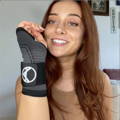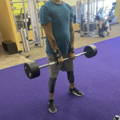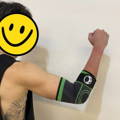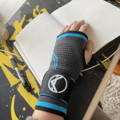
What Do Knee Sleeves Do for Lifting?
june 27, 2023 | 4 Mins Read
TABLE OF CONTENTS
1. What Do Knee Sleeves Do for Lifting?
2. Do You Really Need Knee Sleeves for Weightlifting?
3. Are There Any Risks of Using Knee Sleeves for Weightlifting?
4. How Do I Choose the Right Knee Sleeves for Weightlifting?
5. When to Wear Knee Sleeves for Weightlifting?
6. Should I Choose 5mm or 7mm Knee Sleeves for Weightlifting?
7. Are Knee Sleeves, Braces, and Wraps the Same?
Weightlifting, with its sweat, grit, and clanging iron, is a journey of pushing limits. And like any journey, it's crucial to have the right gear. You've probably seen them around - those snug bands worn around the knees of lifters, from the newbies to the seasoned pros. But are they just a trend, or do they genuinely add value to your lifting routine?
In this article, we’ll address those pitfalls and how you can best use knee sleeves for maximum benefit when lifting weights.
Designed specifically to support the knee, knee compression sleeves serve a dual purpose: safeguarding against injuries and reducing knee pain and swelling post-exercise. Easily worn by sliding them up the legs until they rest at knee level, they provide warmth and compression to the knee joints. This compression not only maintains joint warmth but also promotes better blood flow, aiding in injury prevention.
In professional and amateur weightlifting circles alike, knee sleeves are considered an essential accessory. While they don't inherently increase a lifter's strength, they offer the necessary protection and support, enabling lifters to train harder, recover faster, and achieve their lifting goals more safely.
The answer isn't a simple “yes” or “no.” It depends on a variety of factors, including your fitness level, training goals, and physical limitations. If you regularly engage in heavy squats, deep lunges, or other leg exercises that put significant stress on the knees, knee sleeves can make a world of difference.
On the other hand, some lifters feel like knee sleeves are more of a placebo effect - that their benefits are overstated and that you could achieve similar results with proper form and technique. In general, if you need the added support, protection from the risk of injury, and less pain following a workout, knee sleeves are for you.
Let's look at the pros of wearing knee sleeves in weightlifting:

Identifying the perfect size of knee sleeves for your weightlifting sessions is more than just a numbers game. It's about striking the right balance between compression, comfort, and flexibility.
Let's dive deeper into how you can ensure the best fit for your weightlifting adventures.
The best weightlifting knee sleeves will provide a degree of compression that offers support but does not compromise your comfort or impede circulation. This means that bending your knees should come with a hint of resistance as you spring up from deep squats or heavy lifts.
If the sleeve slips on effortlessly like a regular sock, it probably won't give you the necessary support during weightlifting.
Read this guide on how tight should knee sleeves be.
Knee sleeves can be worn before, during, and after weightlifting sessions. Depending on your individual needs, they can provide support and protection whenever it’s needed. Here are a few tips for when to wear knee sleeves for maximum benefit:
If your knees need extra stability during weightlifting sessions, knee sleeves can come to the rescue. They offer critical support to the joint, reducing the risk of misalignment or other knee-related issues.
Not only do they aid in preventing injury, but they also promote better knee positioning in movements like squats and deadlifts. Remember, though, knee sleeves aren't a cure-all solution; they're a supplement to proper form and strength training.
Learn the main difference of knee sleeves vs knee wraps.
Cold environments can make your muscles stiff and more prone to injuries. Knee sleeves provide the necessary warmth to your knee joint, thereby enhancing flexibility.
This improved mobility due to the warmth can lead to more efficient movement patterns, less muscle stiffness, and a reduced risk of injury during your weightlifting session.
Minor aches and pains in the knee can occur due to overuse or lack of adequate recovery time. In such cases, knee sleeves can help by providing compression and warmth, which can alleviate discomfort and accelerate healing.
Squatting, by nature, puts a lot of pressure on your knees. Knee sleeves can provide the necessary support and stability to handle this pressure.
They can help maintain proper knee alignment throughout the movement, ensuring you're engaging the right muscles and not placing undue stress on the knee joint.
Knee sleeves are invaluable during workouts that involve a high degree of knee flexion or dynamic movements, such as lunges, box jumps, or even sprinting.
These exercises can strain the knee joint, and the stability provided by knee sleeves can keep your knees safe while also boosting your performance.
When you're lifting heavy, every bit of support matters. Knee sleeves can provide this additional support, ensuring that your knees remain stable under heavy loads.
By enhancing proprioception, they can improve your overall lifting mechanics, helping you perform better and lift more. So, before you go for that personal best, ensure your knee sleeves are part of your gear.
Read this guide on how to wash knee sleeves for extended use.

Weightlifting knee sleeves range in thickness from 3mm, 5mm to 7mm. Before your purchase your sleeves, you should consider several factors, including your training intensity, your mobility needs, and the kind of lifts you're doing.
When it comes to using knee sleeves for weightlifting, it's crucial to avoid certain mistakes that can hinder your progress and potentially lead to injury. Here are a few key pitfalls to steer clear of:
Cheating occurs when you sacrifice proper form to lift weights that are too heavy for you. Whether it's using momentum to swing the weights or compromising your posture, cheating not only limits the gains you can make but also increases the risk of injury.
Knee sleeves provide support, but they won't magically fix improper lifting mechanics. Focus on maintaining proper form to maximize gains and minimize the risk of injury, while utilizing knee sleeves as an additional tool for support.
Active recovery plays a vital role in optimizing your rest days. It's tempting to think that rest means complete inactivity, but engaging in low-impact activities like gentle stretching, foam rolling, or light mobility exercises can promote blood circulation, reduce muscle stiffness, and aid in recovery.
Don't forget that wearing knee sleeves during active recovery can provide additional compression and support to help alleviate any discomfort.
Don't rely solely on muscle soreness as an indicator of when to rest. Soreness is not always an accurate reflection of the amount of work done or the benefits gained from a workout.
Pushing through intense muscle soreness without proper rest can lead to overtraining, increased risk of injury, and hindered progress. Listen to your body, prioritize rest days, and allow for adequate recovery time between intense training sessions.
Powerlifters, bodybuilders, and athletes in other sports have trusted the Koprez Knee Sleeves for years. These knee sleeves are designed to deliver the perfect mix of compression and warmth with a snug and contoured fit that stays in place during your workout. Other features include:
One of the highlights of the Koprez Knee Sleeves is their ability to provide maximum support without adding bulk. The lightweight fabric reduces fatigue and ensures a comfortable fit that adds virtually no weight.
Author

Claire Evans worked as the content marketing manager at Koprez. Claire combined a background of writing and editing, marketing, and patient education to best serve consumers, fitness enthusiasts, athletes, and anyone who relies on the Koprez brand for helpful information.
Koprez® Featured Products


"I sprain my wrist super often, so I decided to try out this sleeve. This is game-changing! I've been using it for a while now, and my wrists feel amazing. I haven't gotten in any injuries since using it too. It just makes my wrists feel so supported."
Alexis A.


"Use this for my boxing training. It is a very comfortable brace and does not move out of position during skipping ropes and sparring sessions. I use it while running too. Probably the best brace I've purchased throughout the years. It is very flexible. Makes me look like a pro! :)"
Samuel L.


"I've just got back to running after a couple of years of being plagued by injury. These compressions socks are helping give me peace of mind while I build up my distance again. They are the perfect level of compression, super comfy, and very high quality. Feel great while on a run, and looks great in the orange colour I have!"
Dave R.


"I have a weak ankle, and the Koprez ankle sleeve has been a lifesaver. Wear it every day. Super breathable and comfortable. Like wearing a cool sporty looking sock!"
James F.


"This is the best knee sleeve I've ever tried. It's now a must-have for all my exercises. A few years ago, I had an accident that damaged my knees, but with Koprez I can be active again with no knee pains at all. It's been truly amazing!"
Alex M.


"One of the best purchases I've ever made. It fits your legs all the way from top to bottom, great snug fit, gives you support and definitely helps during rehab and training."
Rafael A.


"I had a minor elbow injury, and Koprez sleeve was super supportive and definitely helped me recover faster. I still use the sleeve to prevent further injury. So far, so good. Very comfortable and does not feel hot at all. Highly recommend!"
Corey B.


"It's really been a game-changer for me. It allows me to exercise a lot longer than I used to. Now my knees don't hurt, and they're not uncomfortable at all."
Mike P.


"Great product!!"
Harold


"I have carpal tunnel, and this brace has helped me work pain-free. Love the materials, and I can feel my wrists slowly getting better, even when I don't wear them!"
Christopher J.


"I wanted to try out these sleeves to improve my squats and deadlift in the gym without worrying about injuring my knees. They stayed up throughout the entire gym session, and my knees feel super supported. Now I can do what I love for years to come. "
Corbin C.